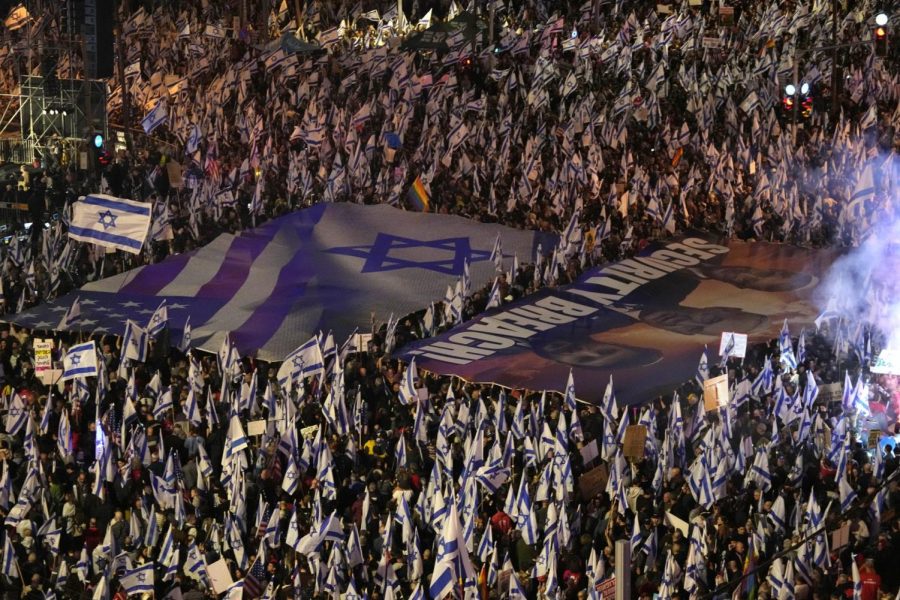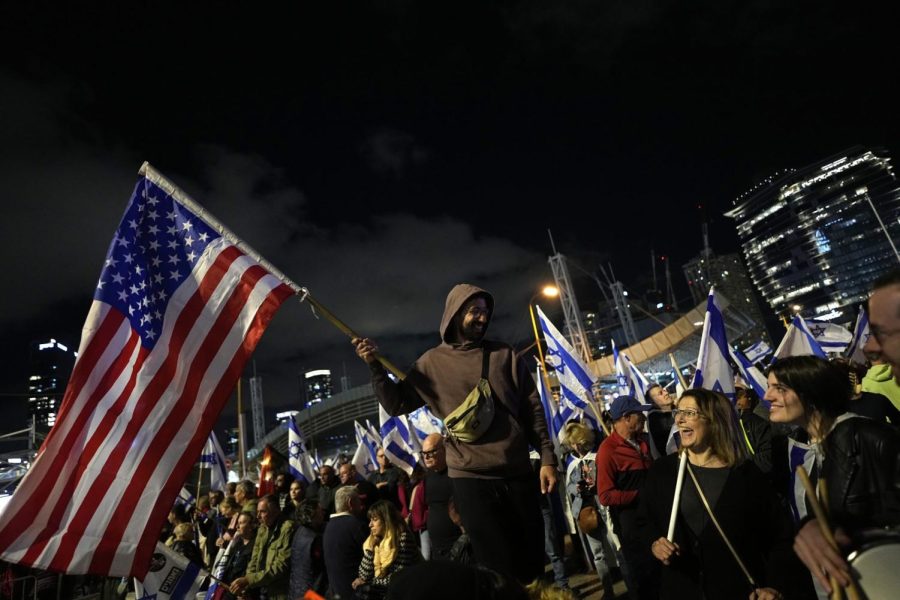Israel protests continue as Netanyahu promises negotiation
Credit: Ohad Zwigenberg | Associated Press/The DePaulia
Protesters gathered in Tel Aviv, Israel to protest the Israeli government’s judicial overhaul.
Since being elected as Israel’s prime minister for the fifth time in November 2022, Benjamin Netanyahu and his right-wing coalition government have drawn plenty of attention and controversy.
More recently, his latest judicial reforms, announced in January,, caused an uproar in Israel. According to The Guardian, the focus of the reforms is “to allow a simple majority of 61 in the 120-seat Knesset to override almost any supreme court rulings, and to allow politicians to appoint most of the justices to the bench.”
In response to the proposed reforms, tens of thousands of Israelis took to the streets to protest and the largest labor union in Israel called a general strike. This union, the Histadrut, represents over 700,000 workers in a wide variety of industries such as health, transit and tech, according to CBS News.
The protests have drawn in many from across Israeli society.
“You have thousands of military veterans,” said DePaul journalism professor Chris Bury, formerly an ABC Nightline correspondent. “The protests here are not stratified as some one, you know, left-wing young group.”
As a result of the protests, Netanyahu agreed to pause the legislative effort until after the Knesset’s Passover recess.
There are many potential ways in which these reforms and protests could affect the political landscape of Israel.
“This would, in effect, undermine an important check on the exercise of Parliamentary power and allow greater leeway for the Netanyahu government to impose its will without constraint,” said DePaul political science professor Scott Hibbard. “It is this aspect of the issue that raises concerns about the future of democracy in the country.”

By contrast, law professor Steven Resnicoff, director of the DePaul College of Law Center for Jewish Law & Judaic Studies, felt that the reforms were important.
“A number of the judicial reforms are long overdue and, indeed, are necessary to preserve Israel’s democracy, despite the opposite claim made by people who are either ignorant about the current rules or are simply driven by politics to oppose the current Israeli government,” Resnicoff said.
Resnicoff also commended the peaceful and democratic nature of the protests and pointed out that Netanyahu’s government appears to be working out a compromise on the reforms.
“I am confident that some reforms will be peaceably implemented with pro-democratic results,” Resnicoff said.
Another important reasoning behind these protests is that these judicial reforms are coming at a time when Netanyahu is being investigated on corruption charges.
According to the New York Times, “The investigations into Mr. Netanyahu’s conduct began in 2016, when the authorities pursued claims that the prime minister had a habit of performing official favors for wealthy businessmen in exchange for gifts both material and intangible.”
This attempt to control the same legislature invites comparisons to other democratic nations that have recently had high-profile right-wing leaders try to circumvent the rule of law.
“To this end, what is happening in Israel is symptomatic of the larger trends playing out in Hungary, Poland and this country,” said Hibbard. “And like those other countries, there is a great deal of skepticism on the political right/populist right of government institutions, such as the Israel Supreme Court, which they see as captured by the political/secular left. This is what is motivating the far right.”
Bury agrees but says he feels “heartened” by the Israel protests.
“The people of Israel are letting Netanyahu know, in no uncertain terms, how they feel about this attempt to weaken the Supreme Court of Israel,” he said. “If you push democracies too far, they will stand up for themselves … and push back in meaningful ways.”
The Israel protests have also caught the attention of the American Jewish community. On Feb. 1 of this year, 170 Jewish community leaders signed an open letter acknowledging and affirming the bond between the American Jewish community and Israel while stating their concerns about the current actions of the Netanyahu administration.
Leaders in the DePaul Jewish community have also recognized this multiplicity of views within the American Jewish community.
Rav Ezra Balser, a rabbi for Metro Chicago Hillel who works on several college campuses including DePaul, says that many American Jews find Israel to be central to their Jewish identity.
Balser said that the protests are an issue “where the American Jewish community has felt the need to speak up in certain ways that they haven’t in the past.”
Despite this, he feels that the Jewish community, both in Israel and globally, has the ability to endure any conflict over issues such as these reforms.
“We believe in unity, but we don’t, we don’t believe in uniformity,” Balser said.







